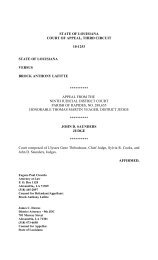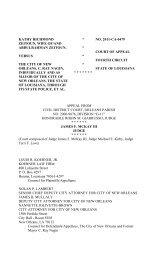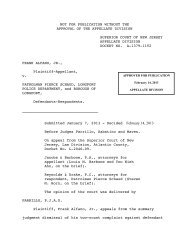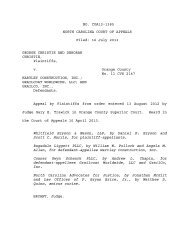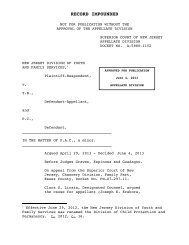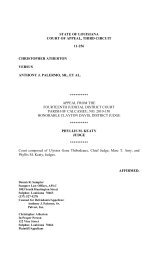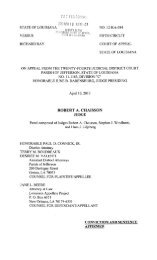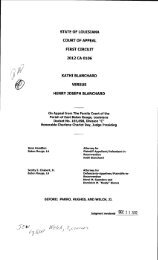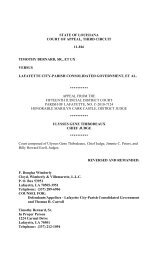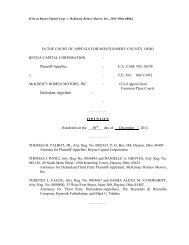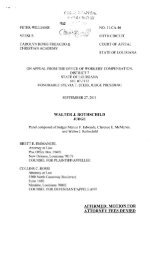state of louisiana court of appeal, third circuit 13-115 james patrick ...
state of louisiana court of appeal, third circuit 13-115 james patrick ...
state of louisiana court of appeal, third circuit 13-115 james patrick ...
Create successful ePaper yourself
Turn your PDF publications into a flip-book with our unique Google optimized e-Paper software.
STATE OF LOUISIANACOURT OF APPEAL, THIRD CIRCUIT<strong>13</strong>-<strong>115</strong>JAMES PATRICK PATINVERSUSLEO WILLIAM FERGUSON**********APPEAL FROM THETWELFTH JUDICIAL DISTRICT COURTPARISH OF AVOYELLES, NO. 2010-5961-BHONORABLE WILLIAM BENNETT, DISTRICT JUDGE**********ULYSSES GENE THIBODEAUXCHIEF JUDGE**********Court composed <strong>of</strong> Ulysses Gene Thibodeaux, Chief Judge, Elizabeth A. Pickett,and John E. Conery, Judges.David Payne SpenceP. O. Drawer 12365Alexandria, LA 7<strong>13</strong>15-2365Telephone: (318) 487-4300COUNSEL FOR:Defendant/Appellant - Leo William FergusonEdwin Gustav Preis, Jr.Preis & RoyP. O. Drawer 94-CLafayette, LA 70509Telephone: (337) 237-6062COUNSEL FOR:Plaintiff/Appellee - James Patrick PatinAFFIRMED.
THIBODEAUX, Chief Judge.In this business dispute, the plaintiff, James Patin, alleges that his comemberin their joint limited liability company (“LLC”), American Recycling,LLC (“American Recycling,” “the LLC,” or “the company”), defendant WilliamFerguson, breached his fiduciary duties to the LLC by unilaterally selling thecompany’s primary piece <strong>of</strong> equipment, an Al-jon Model 580 CL Logger Baler(“the Baler”) and dissolving the company. The trial <strong>court</strong> agreed with Mr. Patinand awarded damages. Mr. Ferguson <strong>appeal</strong>s the trial <strong>court</strong>’s judgment. Weaffirm.I.ISSUESWe must decide whether the trial <strong>court</strong> erred in finding:(1) that the Baler purchased by Mr. Ferguson was a capitalcontribution to the LLC;(2) that Mr. Ferguson breached his fiduciary duties to the LLC andto Mr. Patin by selling the Baler and by dissolving the LLC; and(3) that Mr. Patin was entitled to damages in the amount <strong>of</strong>$161,666.00.II.FACTS AND PROCEDURAL HISTORYIn January 2006, the parties formed American Recycling, a companythat acquired scrap metal, baled and compacted the scrap, then re-sold the baledscrap at a pr<strong>of</strong>it. Under the Articles <strong>of</strong> Organization (“the Articles”), the company
was member-managed, and Mr. Ferguson and Mr. Patin comprised themembership.Once each member had been proportionally reimbursed for hiscapital contribution, pr<strong>of</strong>its and losses would be split between the two members onan equal basis. Article IX <strong>of</strong> the Articles specifically provided as follows:All pr<strong>of</strong>its and/or losses <strong>of</strong> the company shall beshared and disbursed to the members in direct proportionto the percentage <strong>of</strong> monies paid in capital and/or loansby each respective member until and only all [sic] actualdollar amounts so loaned or contributed are repaid,without interest or tax considerations. Immediately afterpayout, all pr<strong>of</strong>its and/or losses shall be paid and/orallocated, such that members, James Patrick Patin, shallbe granted Fifty percent (50%) and Leo WilliamFerguson, shall be granted Fifty percent (50%).The parties orally agreed that Mr. Ferguson’s contribution to thecompany would consist <strong>of</strong> the purchase <strong>of</strong> the Baler 1 and other start-up costs, andMr. Patin’s contribution would consist <strong>of</strong> his personal service and extensiveexpertise in the scrap metal industry. Both parties testified that they consideredthese agreements regarding the business operations and start-up capital to bebinding agreements.Mr. Ferguson purchased the Baler for $412,757.00, and he advanced$20,500.00 in cash to start the company. Though the Baler was purchased in Mr.Ferguson’s name, it was dedicated to the company’s operations. The companyoperated from March 2006 through June 2008.During the operation <strong>of</strong> thecompany, Mr. Ferguson was paid $159,500.00 toward the purchase price <strong>of</strong> theBaler. While the company operated, Mr. Patin was paid $2,083.00 per month as asalary. Mr. Ferguson did not receive a salary, but Mr. Patin testified that the1 The Baler was crucial to the operation <strong>of</strong> the business. It was used to compact or “bale”metal into more easily handled scrap.2
parties agreed that once the Baler was paid for, the salary funds would be “caughtup.”The business records <strong>of</strong> the company and the testimony <strong>of</strong> the partiesindicate that the company was pr<strong>of</strong>itable during its two-year run. Despite thatpr<strong>of</strong>itability, at some point in 2008, Mr. Ferguson decided that he no longer wantedto operate a business with Mr. Patin. Mr. Ferguson testified that he lost trust inMr. Patin due to Mr. Patin’s failure to repay a personal loan Mr. Fergusonadvanced to him. Mr. Ferguson abruptly demanded possession <strong>of</strong> the Baler andrequested an audit <strong>of</strong> the business records. Mr. Patin immediately complied withMr. Ferguson’s demands.Mr. Ferguson first <strong>of</strong>fered to sell the Baler to Mr. Patin. Mr. Patincould not afford to purchase it.He asked Mr. Ferguson to provide ownerfinancing, but Mr. Ferguson refused. Thereafter, Mr. Ferguson sold the Baler to a<strong>third</strong> party for $360,000.00. Without the Baler, American Recycling closed.Mr. Ferguson not only sold the most important asset <strong>of</strong> the company,but he also closed the company’s bank account, which had $38,883.53 on deposit.He also retained the proceeds <strong>of</strong> a workers’ compensation premium refund in theamount <strong>of</strong> $3,076.00.At trial, Mr. Ferguson attempted to explain his actions by <strong>of</strong>fering thetestimony <strong>of</strong> his wife, Yolanda Ferguson. Mrs. Ferguson testified that she did notwant her husband to go into business with Mr. Patin. Despite her wariness, shemaintained the checkbook for American Recycling. Her testimony indicates thatshe was very upset with Mr. Patin for not repaying the personal loan Mr. Fergusonprovided.3
In addition to Mrs. Ferguson’s testimony, Mr. Ferguson <strong>of</strong>fered thetestimony <strong>of</strong> a financial expert, Richard Urban. Mr. Urban’s opinions, issuedthrough two depositions, <strong>state</strong> that the Baler was not an asset <strong>of</strong> the company butrather was rented to the company at a rate <strong>of</strong> $6,312.00 per month based on a cost<strong>of</strong> $380,882.00 at six percent with no residual value. No evidence in the recordsupports Mr. Urban’s opinions.Mr. Patin submitted the testimony <strong>of</strong> his own financial expert,Michael Carbo. Mr. Carbo testified as to the fair market value <strong>of</strong> AmericanRecycling as <strong>of</strong> the dissolution date <strong>of</strong> June 19, 2008. The net asset value <strong>of</strong> thecompany, according to Mr. Carbo, was $78,352.00.Mr. Carbo’s calculationassumed that the Baler was a capital contribution to the company. Thus, accordingto Mr. Carbo, Mr. Patin was entitled to one-half <strong>of</strong> $78,352.00, or the sum <strong>of</strong>$39,176.00.Mr. Carbo also testified regarding Mr. Patin’s past lost wages andfuture lost earnings. Regarding past lost wages, Mr. Carbo based his calculationson the fact that Mr. Patin received a salary <strong>of</strong> $2,083.00 per month for his workwith American Recycling. Mr. Carbo testified that from the date <strong>of</strong> dissolution <strong>of</strong>the company to the date <strong>of</strong> trial, Mr. Patin would have earned $111,370.00. 2Mr.Carbo also opined as to Mr. Patin’s future earnings. He theorized that, without Mr.Ferguson’s actions, American Recycling would likely have operated pr<strong>of</strong>itably foranother ten years, earning Mr. Patin $116,852.00.The trial <strong>court</strong> considered all <strong>of</strong> the evidence presented and foundthat: (1) the Baler was a capital contribution to the company; (2) Mr. Ferguson2 Mr. Carbo’s calculation includes forty-one pay periods between July 2008 andNovember 2011 totaling $90,196.00. At trial, Mr. Carbo testified that the $111,370.00 amountwas the present day value <strong>of</strong> those earnings.4
eached his fiduciary duties to the company and to Mr. Patin; and (3) Mr. Patinwas entitled to judgment in his favor and against Mr. Ferguson. The trial <strong>court</strong>awarded damages to Mr. Patin in the following sums: (a) $39,176.00, representingone-half <strong>of</strong> the fair market value <strong>of</strong> American Recycling as <strong>of</strong> the dissolution date;(b) $62,490.00, representing past lost wages; (c) $50,000.00, representing futurelost earnings; and (d) $10,000.00 representing general damages.The trial <strong>court</strong> discounted Mr. Carbo’s calculations regarding past lostwages because they did not take into account that Mr. Patin was able to sell somescrap metal in an individual capacity between June 2008 and June 2010 to earnsome money. Moreover, the trial <strong>court</strong> reasoned that Mr. Carbo’s calculations alsodid not consider that Mr. Patin had received supplemental security income sinceJanuary 2011 in the amount <strong>of</strong> $698.00 per month. The trial <strong>court</strong> also discountedMr. Carbo’s testimony regarding Mr. Patin’s future lost earnings. Specifically, thetrial <strong>court</strong> <strong>state</strong>d that Mr. Carbo’s estimate that the business would operate for tenyears, yielding Mr. Patin $116,852.00, did not consider Mr. Patin’s poor health anddeteriorating physical condition.III.LAW AND DISCUSSIONStandard <strong>of</strong> ReviewA trial <strong>court</strong>’s finding <strong>of</strong> fact may not be reversed absent manifesterror or unless it is clearly wrong. Stobart v. State, through Dep’t <strong>of</strong> Transp. andDev., 617 So.2d 880 (La.1993). The reviewing <strong>court</strong> must do more than simplyreview the record for some evidence which supports or controverts the trial <strong>court</strong>’sfindings; it must instead “review the record in its entirety to determine whether the5
trial <strong>court</strong>’s finding was clearly wrong or manifestly erroneous.” Id. at 882. Theissue to be resolved on review is whether the fact finder’s conclusion was areasonable one, not whether it was right or wrong. Id. The reviewing <strong>court</strong> mustalways keep in mind that “if the trial <strong>court</strong> or jury’s findings are reasonable in light<strong>of</strong> the record reviewed in its entirety, the <strong>court</strong> <strong>of</strong> <strong>appeal</strong> may not reverse, even ifconvinced that had it been sitting as the trier <strong>of</strong> fact, it would have weighed theevidence differently.” Id. at 882-83 (quoting Housley v. Cerise, 579 So.2d 973,976 (La.1991)).With respect to the quantum <strong>of</strong> damages and the review <strong>of</strong> an award<strong>of</strong> general damages, the supreme <strong>court</strong> has held that the assessment <strong>of</strong> “quantum,”or the appropriate amount <strong>of</strong> damages, is a determination <strong>of</strong> fact entitled to greatdeference on review. As such, “the role <strong>of</strong> an appellate <strong>court</strong> in reviewing generaldamages is not to decide what it considers to be an appropriate award, but rather toreview the exercise <strong>of</strong> discretion by the trier <strong>of</strong> fact.” Youn v. Maritime OverseasCorp., 623 So.2d 1257, 1260 (La.1993), cert denied, 510 U.S. 1114, 114 S.Ct.1059 (1994).Status <strong>of</strong> the BalerNeither party disputes that the Baler was the “heart and soul” <strong>of</strong> thebusiness. A dispute exists, however, regarding its ownership. Mr. Patin argues,and the trial <strong>court</strong> agreed, that the Baler was a capital contribution to the company.Mr. Ferguson counters that he personally purchased the Baler and only agreed tolease it to the LLC.A capital contribution is “anything <strong>of</strong> value that a person contributesto the limited liability company as a prerequisite for, or in connection with6
membership, including cash, property, services rendered, or a promissory note orother binding obligation to contribute cash or property or to perform services.”La.R.S. 12:<strong>13</strong>01(A)(3). A capital contribution does not have to take the form <strong>of</strong>cash; indeed, the contribution <strong>of</strong> a member can take the form <strong>of</strong> cash, property, orservices performed to the LLC. La.R.S. 12:<strong>13</strong>21.Here, the record is replete with evidence that the parties orally agreedthat Mr. Ferguson would contribute cash and the Baler as capital to the company,and Mr. Patin would contribute his knowledge <strong>of</strong> the scrap business, his expertisein operating the Baler, and his time and services rendered in the daily operation <strong>of</strong>the company.Moreover, Mr. Ferguson testified that the sole purpose <strong>of</strong>purchasing the Baler was to begin the operation <strong>of</strong> the company.Mr. Ferguson attempts to refute this abundant evidence by firstarguing that if his intent was to contribute the Baler to the company, he would haveformalized the agreement. Mr. Ferguson’s argument is weakened by key factsproduced at trial. Namely, Mr. Ferguson and Mr. Patin did reach an agreement.The parties orally agreed that in exchange for his contribution <strong>of</strong> the Baler to thecompany, Mr. Ferguson would receive not only repayment for the Baler, but also aperpetual fifty percent share in the company’s pr<strong>of</strong>its.As a result <strong>of</strong> thatagreement, Mr. Ferguson received nearly half the purchase price <strong>of</strong> the Baler—anobvious return on his capital contribution to the company.The evidence in the record also does not support Mr. Ferguson’sassertion that he merely rented the Baler to the company. The existence <strong>of</strong> a rentalagreement was unsubstantiated by any credible evidence. Thus, we find no error inthe trial <strong>court</strong>’s judgment that the Baler was a capital contribution to the LLC.7
Breach <strong>of</strong> Fiduciary DutiesThough Mr. Ferguson does not assign it as error in his appellate brief,implicit in his argument on <strong>appeal</strong> is that the trial <strong>court</strong> erred in finding that hebreached his fiduciary duties to the LLC and to Mr. Patin. We find no error in thetrial <strong>court</strong>’s judgment that Mr. Ferguson breached his fiduciary duties.Louisiana Revised Statutes 12:<strong>13</strong>14(A)(1) provides that any memberor manager entrusted with managing the business shall “stand in a fiduciaryrelationship to the limited liability company and its members” and shall act “ingood faith, with the diligence, care, judgment, and skill which an ordinary prudentperson in a like position would exercise under similar circumstances.” In Bryan D.Sc<strong>of</strong>ield, Inc. v. Susan A. Daigle, Ltd., 08-798, p. 4 (La.App. 3 Cir. 12/10/08), 999So.2d 311, 314, a panel <strong>of</strong> this <strong>court</strong> recognized that the LLC law “provides thatmembers with management responsibilities have fiduciary obligations, including aduty <strong>of</strong> care and duty <strong>of</strong> loyalty, not only to the limited liability company but to theother members as individuals also.” The <strong>court</strong> further <strong>state</strong>d that, “a fiduciary maynot take even the slightest advantage, but must zealously, diligently, and honestlyguard and champion the rights <strong>of</strong> his principal . . . and is bound not to . . . conflictwith the interest <strong>of</strong> the principal to even the slightest extent.” Id. at 316.Moreover, the supreme <strong>court</strong> has recognized that the duty <strong>of</strong> loyalty includes theobligation <strong>of</strong> “utmost good faith, fairness, and honesty in their dealings with eachother with respect to the matters pertaining to the enterprise.” Scheffler v. Adamsand Reese, LLP, 06-1774, fn. 2 (La. 2/22/07), 950 So.2d 641, 648.In Sc<strong>of</strong>ield, 999 So.2d at 315, the <strong>court</strong> <strong>state</strong>d that “a member has adirect right <strong>of</strong> action against other members individually for a breach <strong>of</strong> fiduciary8
duty when such breach is grossly negligent and the damage is to the suing memberdirectly.” The <strong>court</strong> explained:Id.The Limited Liability Company Law furtherprovides that a member “shall not be held personallyliable to the limited liability company or the members”unless the member “acted in a grossly negligent manner... or engaged in conduct which demonstrates a greaterdisregard <strong>of</strong> the duty <strong>of</strong> care than gross negligence,including but not limited to intentional tortuous conductor intentional breach <strong>of</strong> his duty <strong>of</strong> loyalty.” La.R.S.12:<strong>13</strong>14(B). Gross negligence is defined “as a recklessdisregard or a carelessness amounting to indifference tothe best interests <strong>of</strong> the limited liability company or themembers there<strong>of</strong>.” La.R.S. 12:<strong>13</strong>14(C).With this standard at the backdrop, it is clear not only that Mr. Patinhas a direct right <strong>of</strong> action against Mr. Ferguson but also that Mr. Fergusonbreached his fiduciary duties to the LLC and to Mr. Patin. In reckless disregard <strong>of</strong>his duties <strong>of</strong> good faith and loyalty, and without notice to Mr. Patin, Mr. Fergusonsold the Baler to a <strong>third</strong> party; retained the entire purchase price <strong>of</strong> the Baler;emptied American Recycling’s checking account; removed Mr. Patin as anauthorized user <strong>of</strong> the account; and took possession <strong>of</strong> over $3,000.00 paid to theLLC by its workers’ compensation insurer. Mr. Ferguson’s actions were blatant,malicious, and grossly negligent. It is undisputed that Mr. Ferguson’s actionseffectively dissolved the LLC and ended Mr. Patin’s livelihood.Moreover, Mr. Ferguson’s actions conflicted with Louisiana LLC law.Louisiana Revised Statutes 12:<strong>13</strong>18(B) requires a majority vote <strong>of</strong> the members toapprove the sale, exchange, lease, mortgage, pledge, or other transfer <strong>of</strong> all orsubstantially all <strong>of</strong> the assets <strong>of</strong> the LLC and to approve the dissolution andwinding up <strong>of</strong> the LLC, unless otherwise provided in the Articles <strong>of</strong> Organization9
or a written operating agreement. Neither agreement was present here. Instead,Mr. Ferguson unilaterally sold the most valuable asset <strong>of</strong> the business—theBaler—and transferred all assets from American Recycling’s account to his own.He deliberately took these actions without any notice or discussions with Mr.Patin, in direct violation <strong>of</strong> La.R.S. 12:<strong>13</strong>18(B).Mr. Ferguson acted selfishly and without any regard for Mr. Patin orAmerican Recycling. He behaved in a grossly negligent manner, and he breachedhis fiduciary duties.Indeed, his breaches <strong>of</strong> his fiduciary duties renderedAmerican Recycling inoperable and deprived Mr. Patin <strong>of</strong> his sole source <strong>of</strong>income.Thus, we agree with the trial <strong>court</strong> that Mr. Ferguson violated hisfiduciary duties and acted with gross negligence. As such, Mr. Patin is entitled todamages.DamagesIn assessing damages, the trial <strong>court</strong> considered the expert testimony<strong>of</strong> Mr. Carbo and Mr. Urban. The trial <strong>court</strong> noted that the testimony <strong>of</strong> the twoexperts differed greatly, with the major point <strong>of</strong> differentiation based upon Mr.Urban’s conclusion that the Baler was not an asset <strong>of</strong> the business. The trial <strong>court</strong>made a factual finding that the Baler was a capital contribution to the company.Thus, it discounted Mr. Urban’s testimony and agreed with Mr. Carbo’sassessment <strong>of</strong> damages. Moreover, it is clear from the trial <strong>court</strong>’s written reasonsfor judgment that it found Mr. Carbo to be a much more credible witness. Indeed,the trial <strong>court</strong> noted that Mr. Urban’s depositions brought “confusing results to the<strong>court</strong>,” and his opinions appeared to be “arbitrary, self-serving, and withoutsupport <strong>of</strong> the evidence submitted in the case at bar.”10
We find no error in the trial <strong>court</strong>’s award for damages, includingthose awarded to Mr. Patin for fifty percent <strong>of</strong> the net asset value <strong>of</strong> AmericanRecycling; past lost wages; and general damages. We also find no error in the trial<strong>court</strong>’s award <strong>of</strong> $50,000.00 for future lost earnings.Though the trial <strong>court</strong>inelegantly used the word “arbitrary” in describing the $50,000.00 award, we findthat strong support existed in the record for award <strong>of</strong> $50,000.00 or more for futurelost earnings.It is clear from the trial <strong>court</strong>’s thorough written reasons forjudgment that he considered all <strong>of</strong> Mr. Carbo’s testimony. The trial <strong>court</strong> merelydisagreed with Mr. Carbo regarding the viability <strong>of</strong> Mr. Patin’s long-termemployment prospects.IV.CONCLUSIONFor the reasons articulated above, we affirm the judgment <strong>of</strong> the trial<strong>court</strong>. Costs <strong>of</strong> this <strong>appeal</strong> are assessed against Leo William Ferguson.AFFIRMED.11



